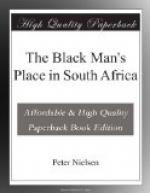Nature having cast upon the male the duty of winning and holding the females of his species it is easy to see why the racial feelings of jealousy and ill-will are more positive and more active in the man than in the woman, and this explains, as far as these things can be explained, why white men will allow themselves to cohabit freely with black women to whom they feel naturally attracted but will “see red” and commit murder as soon as they find a black man attempting to gain the favour of a woman of their own colour. “Un adolescent aime toutes les femmes” say the French, and it is generally accepted that man is by nature more inclined to polygamy than woman is towards polyandry, still man and woman are both swayed and motived by the same elemental jealousy that is born of fear of losing something valued; the emotion which Descartes has so well defined as “une espece de crainte qui se rapport au desir qu’on a de se conserver la possession de quelque bien.”
It is, no doubt, true that the thinking white woman, no less than the thinking white man, is led to feel dismay and even resentment against the Natives by apprehension of the possibility of danger to white civilisation through fusion of white and black, but this is a feeling caused by intelligent appreciation rather than by instinctive apprehension, and as such liable to be dispelled by argument tending to show that no real danger threatens. During a recent agitation against miscegenation in Rhodesia a number of letters written by white women appeared in the press from which it was easy to gather that the chief concern of the writers was not the possible degradation of the whites, though this was not overlooked, but rather the simple fact that some white men were cohabiting with black women to the prejudice of the matrimonial chances of eligible women of their own race.
But it is unwise to dogmatise in the realms of social and racial psychology; we have not yet discovered the means for analysing with precision the subtle elements of the human soul. I have used the word instinct here in the sense given to it by William James, who defines it as “the faculty of acting in such a way as to produce certain ends without foresight of the ends, and without previous education in the performance,” but when we reflect upon the transitoriness of human instincts, as compared with those of animals, and recognise that the human instincts are, as James also says, implanted in us for the sake of giving rise to habits, and then to fade away, we see how difficult it is to draw a line between the instinctive and the acquired or habitual mood or feeling.




